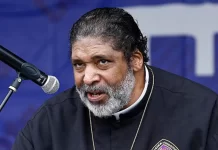By Stacy M. Brown, NNPA Newswire Senior National Correspondent
@StacyBrownMedia
Two months ago, the Federal Communications Commission announced it had opened a proceeding on how to prevent and eliminate digital discrimination to ensure that everyone has equal access to broadband internet access service.
When the agency issued the notice, commissioners called it the beginning of a process to establish a shared understanding of the harms experienced by historically excluded and marginalized communities to make meaningful policy reforms and systems improvements.
“The lack of access to broadband internet service among communities of color, low-income households, and rural communities means that many vulnerable households are disproportionately excluded from full participation in our society and, thus, raises a critical equity and civil rights concern,” members of the task force wrote.
“Congress agrees, and in the Infrastructure Investment and Jobs Act, the Federal Communications Commission and the U.S. Department of Justice have been tasked with ‘eliminating’ digital discrimination.”
The letter, addressed to FCC Chair Jessica Rosenworcel, highlights existing studies that document the disparate deployment and access to high-speed broadband internet for the Commission.
It also emphasized the need for detailed public data used to track and identify discrimination and urges the Commission to adopt interpretations that maximize the anti-discrimination protections of the statute.
Further, the letter asked the Commission to increase its resources for analyzing and identifying digital discrimination, and specifically, to augment the capacity of the Enforcement Bureau, create an Office of Civil Rights, and suggest anti-discrimination legal schemes that may be valuable in interpreting the new law.
FCC officials did not respond to a request for comment.
The task force includes the Communications Workers of America, National Action Network, National Consumer Law Center, National Hispanic Media Coalition, UnidosUS, and the United Church of Christ Media Justice Ministry.
Officials said the task force remains committed to “ensuring that all communities, especially the historically underserved, have access to affordable, reliable, high-quality advanced communications services.”
The letter determined that “high-speed broadband has become an integral platform for education, employment, health care, economic development, civic participation, and communications with family and friends.”
“The lack of access to broadband internet service among communities of color, low-income households, and rural communities means that many vulnerable households are disproportionately excluded from full participation in our society and, thus, raises a critical equity and civil rights concern,” the group wrote.
Passage of the Infrastructure Investment and Jobs Act left the FCC tasked with several directives to combat digital discrimination and redlining.
Earlier this year, Rosenworcel announced the formation of a cross-agency task force focused on preventing digital discrimination.
Rosenworcel said the task force would oversee the development of model policies and best practices states and local governments can adopt that ensure ISPs do not engage in digital discrimination.
Further, the law dictated that those initiatives are completed by November 2023.
“The FCC should use the full panoply of its enforcement tools for the digital discrimination law,” Leadership Conference Task Force members wrote.
“The FCC may issue subpoenas, cease-and-desist letters, monetary forfeitures and enter into consent decrees.”
The letter continued:
“The full Commission and the Enforcement Bureau may pursue these sanctions depending on existing authority.
“In considering and adopting its digital discrimination rules, the FCC should fully involve the Enforcement Bureau as a key player in the rule-creation process.
“The FCC should ensure that it lays out procedures and policies that will lead to maximum enforcement of the digital discrimination law.”
The post The Leadership Conference Pushes FCC to Eliminate Digital Discrimination first appeared on BlackPressUSA.

















